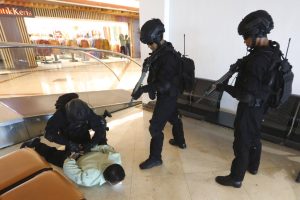Aisyah Llewellyn

In the late 1990s and early 2000s, Indonesia, and the wider Southeast Asia region, was viewed by many as a hostile place.
On Christmas Eve 2000, churches across the country were bombed, leaving 18 people dead. On October 12, 2002, a further series of bombs ripped through Kuta in Bali, killing 202 people and injuring over 200 more. The following year, the JW Marriott Hotel in Jakarta was attacked by a suicide bomber, killing 11 people. In the Philippines, just six days after the Christmas Eve Church bombings in Indonesia, bombs tore through Metro Manila, killing 22 people.
The group that claimed responsibility for all of the attacks was Jemaah Islamiyah (JI), a hardline Islamic group with links to al-Qaida.
In 2001, the al-Qaida-orchestrated attack on the World Trade Center and the Pentagon took place in the United States.
Yet, following the terror of the early 2000s, and the subsequent U.S.-led “War on Terror” that sought to eradicate it, countries such as Indonesia saw a downturn in attacks and a splintering of the groups that had at one point seemed impossibly deadly.
The last JI attack in Indonesia was the 2011 bombing of a police compound in Cirebon in West Java.
With some of the history in mind, it perhaps came as something of a surprise last week in Indonesia, when the authorities arrested 59 suspected militants allegedly affiliated with hardline groups, who police said were planning to stage attacks around Indonesia’s presidential election, which will take place on February 14 of next year.
According to Indonesia’s Counterterrorism Special Detachment 88 unit (Densus 88), the suspects had been stockpiling weapons, bomb making equipment and propaganda materials and had “planned to carry out attacks on security forces who focus on securing the series of election activities.”
According to the authorities, nineteen of the suspects were from JI and 40 were members of the ISIS-affiliated Jamaah Ansharut Daulah (JAD).
JAD, the less famous cousin of JI, has a shadowy history as a splinter group that has taken members from a number of other hardline groups, including Indonesian nationals who returned from Syria under ISIS, but has never achieved quite the same portfolio of terror attacks, although not through lack of trying.
The group was responsible for an attack on a number of churches in Surabaya in 2018, which killed 15 civilians, a 2019 suicide bombing in Medan and a 2021 attack on a cathedral in Makassar. Also in 2019, JAD claimed responsibility for the Jolo church bombings in the Philippines that killed 20 people.
Perhaps the recent arrests in Indonesia are not so surprising after all.
Like many groups that ascribe to radical ideology, hardline organizations are extremely difficult to disband completely, and often mutate within the terrorist ecosystem, with members freely moving to or within other similar groups if one group is quashed or splits organically. Some members of hardline groups also simply stay within their organizations but divert their attention elsewhere, as has been the case with some senior figures within JI who have turned their backs on acts of violence, but who would still consider themselves active members.
Still, should we be worried about the recent arrests in Indonesia, and do they perhaps point to hardline groups lying low and waiting for the right time to strike once again?
Some would perhaps argue that neither JI nor JAD present serious threats.
In JI’s case, it is hardly the organization it once was, with the majority of senior JI figures either jailed, killed in police raids over the years, or deradicalized as a result of government programs. In the case of JAD, it has never managed to emulate the large-scale terror attacks of JI or gain access to the resources of the former, including the Bali Bombing which, was widely rumored to have received significant funding directly from Osama Bin Laden (who is now also dead).
It is also significant that Densus 88, which was created in 2003 in response to the Bali Bombing, was able to apprehend the suspects ahead of the election and demonstrates that the Indonesian authorities continue to do excellent work monitoring and arresting those suspected of planning attacks in the region.
More troublingly however, the arrests also demonstrate that there are still hardline groups in Indonesia with the ability to envision attacks and stockpile weapons, even if the groups have been weakened over the years, and it would be foolish to dismiss these groups as mere remnants of their more ferocious predecessors.
But it is also important to strike a note of balance within the narrative, and perhaps, the recent arrests should simply be viewed as a cautionary tale not to declare the global “War on Terror” a complete success.
While Indonesia and the wider region is unlikely to be on the cusp of another spate of attacks similar to the 2000s, the hardline ecosystem somewhere will always be alive and well, albeit in an ever-changing form.
It is also an ecosystem that, for now, still seems within the grip of the authorities.
No comments:
Post a Comment